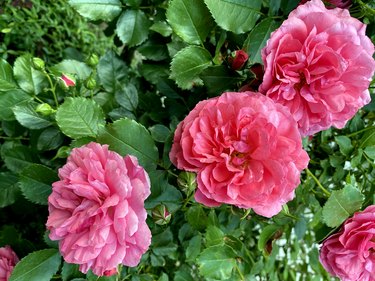
If you see houseflies flocking to your roses (Rosa spp.) in droves, you actually need to worry about another pest altogether: aphids. Houseflies aren't attracted to roses but rather to aphids' sugary excrement. This sticky substance is also called "honeydew," and houseflies aren't the only ones who consider it a food source. Ants, tachinid flies and other insects will also visit roses to harvest honeydew.
Tip
Houseflies are on your roses because they're eating honeydew, which comes from aphids.
Video of the Day
Aphids and Houseflies on Roses
Seeing houseflies on roses is a blessing in disguise because these large, easy-to-see flies warn of an aphid infestation. Aphids are tiny and are hard to spot in comparison. They also tend to congregate out of sight on the underside of leaves and retreat to even cooler hiding spots during the heat of the day. Aphids have built-in camouflage thanks to their green color, but they can also appear yellow, brown, pink, red or white.
Video of the Day
Houseflies don't pose much of a threat to the roses. However, aphids literally suck the life out of the plants they infest, and they are known to spread disease as well, including rose mosaic virus. All in all, it's best to direct your energy toward controlling the aphids. The harmless (but nonetheless annoying) flies will disappear once the aphids are gone.
Controlling Aphids on Roses
Controlling aphids doesn't require the use of toxic pesticides. In fact, spraying pesticides will indiscriminately kill the insects that eat aphids. Of all the predatory insects that can help you naturally control aphids, ladybugs are those most widely available for purchase.
Other options include soldier beetles and soft-wing flower beetles, which will also feed on spider mites and scale bugs. Some types of flies are also beneficial to roses thanks to their aphid diet, including hover flies and long-legged flies. Lacewings and several types of true bugs (such as damsel bugs) will also feast on aphids.
If your roses are in dire need of an immediate intervention, try an organic spray, like neem oil. It's important to note that some roses are sensitive to neem oil, which can injure them, so it's best to spray the oil on a small test patch before saturating an entire rose plant and risk damaging it. Sometimes, a blast of water from the hose is sufficient to knock down aphids, but this technique may backfire by promoting the growth of fungi on the leaves.
Other Flying Insects Attracted to Roses
Other flying insects that you might see on your roses include wasps and bees, both of which are beneficial. Leafcutting bees and rose leafhoppers, however, are undesirable because they will remove large chunks from rose leaves.
Japanese beetles will also eat rose leaves until there's virtually no leaves left, which can seriously stress the plant. These large, coppery insects are slow and sluggish, making them easy to pick off by hand and throw into a bucket of soapy water (the soap ensures they cannot fly out).
One natural predator of Japanese beetles is a fly that looks quite similar to a housefly. Known as a tachinid fly, it will also feed on aphids' honeydew. Allowing dill, coriander and carrot to blossom near your roses will also attract tachinid flies, who enjoy the nectar from these flowers.